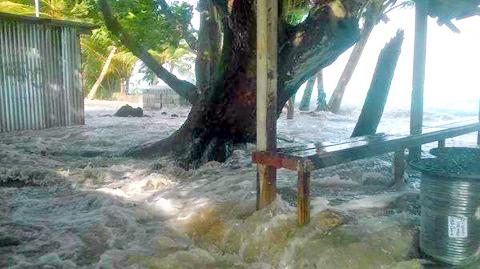Nearly half the population of Tuvalu have been severely affected by the devastation wrought by Cyclone Pam, Tuvaluan Prime Minister Enele Sopoaga said yesterday, with other Pacific island nations also taking a hit.
While the focus has been on devastation in neighboring Vanuatu, Tuvalu — a grouping of nine coral atolls with a population of less than 11,000 — is also struggling to cope, Sopoaga told Radio New Zealand International.
“Forty-five percent of the population of Tuvalu, most of whom are on the outer islands, have been affected, badly, severely affected,” he said of the island chain about 1,550km northeast of Vanuatu. “We are worried about the aftermath in terms of hygiene and supplies of essential materials, like food, medicine and water.”

Photo: EPA
Few details of the impact were given, but Sopoaga said most people living on the outer islands of the diplomatic ally of Taiwan were affected, with houses and crops washed away.
He told the broadcaster there were health and safety concerns after cemeteries were destroyed, adding that government boats were setting off later yesterday to assess the extent of the damage.
Aurelia Balpe, the Fiji-based head of the International Federation of Red Cross and Red Crescent Societies in the Pacific, said there had been extensive flooding in the low-lying nation.
“Tuvalu has had storm surges and up to six of its islands have been affected. People have spoken of four to five meter waves,” she said, adding that “people are hip-high in water.”
“Some houses have fallen over and other infrastructure has been hit, with one hospital destroyed,” she added.
Balpe said other Pacific nations, including the Solomon Islands and Kiribati — also allies of Taiwan — had also been hit.
“Kiribati has also had storm surges,” she said, with the main causeway on the islands badly damaged. “There’s basically one road on the islands and the bridge has been destroyed, which is seriously impacting transport.”
On the Solomon Islands, several houses were razed by landslides.
“It is unprecedented in terms of the number of places impacted, but we have not heard of casualties in the Solomons, Kiribati and Tuvalu at the moment,” Balpe said.
Australian Foreign Minister Julie Bishop said Canberra was responding to a request from Tuvalu, one of the world’s smallest and most remote countries.
“Tuvalu has announced a state of emergency and we are responding to that request with basic supplies, water, sanitation, tents, blankets and food,” Bishop said in Perth, Australia. “In the case of Fiji, Solomon Islands and Kiribati, we understand assessments are being made. The impact is not as great, but we wait to hear.”

A Ministry of Foreign Affairs official yesterday said that a delegation that visited China for an APEC meeting did not receive any kind of treatment that downgraded Taiwan’s sovereignty. Department of International Organizations Director-General Jonathan Sun (孫儉元) said that he and a group of ministry officials visited Shenzhen, China, to attend the APEC Informal Senior Officials’ Meeting last month. The trip went “smoothly and safely” for all Taiwanese delegates, as the Chinese side arranged the trip in accordance with long-standing practices, Sun said at the ministry’s weekly briefing. The Taiwanese group did not encounter any political suppression, he said. Sun made the remarks when

PREPAREDNESS: Given the difficulty of importing ammunition during wartime, the Ministry of National Defense said it would prioritize ‘coproduction’ partnerships A newly formed unit of the Marine Corps tasked with land-based security operations has recently replaced its aging, domestically produced rifles with more advanced, US-made M4A1 rifles, a source said yesterday. The unnamed source familiar with the matter said the First Security Battalion of the Marine Corps’ Air Defense and Base Guard Group has replaced its older T65K2 rifles, which have been in service since the late 1980s, with the newly received M4A1s. The source did not say exactly when the upgrade took place or how many M4A1s were issued to the battalion. The confirmation came after Chinese-language media reported

The Taiwanese passport ranked 33rd in a global listing of passports by convenience this month, rising three places from last month’s ranking, but matching its position in January last year. The Henley Passport Index, an international ranking of passports by the number of designations its holder can travel to without a visa, showed that the Taiwan passport enables holders to travel to 139 countries and territories without a visa. Singapore’s passport was ranked the most powerful with visa-free access to 192 destinations out of 227, according to the index published on Tuesday by UK-based migration investment consultancy firm Henley and Partners. Japan’s and

BROAD AGREEMENT: The two are nearing a trade deal to reduce Taiwan’s tariff to 15% and a commitment for TSMC to build five more fabs, a ‘New York Times’ report said Taiwan and the US have reached a broad consensus on a trade deal, the Executive Yuan’s Office of Trade Negotiations said yesterday, after a report said that Washington is set to reduce Taiwan’s tariff rate to 15 percent. The New York Times on Monday reported that the two nations are nearing a trade deal to reduce Taiwan’s tariff rate to 15 percent and commit Taiwan Semiconductor Manufacturing Co (TSMC, 台積電) to building at least five more facilities in the US. “The agreement, which has been under negotiation for months, is being legally scrubbed and could be announced this month,” the paper said,